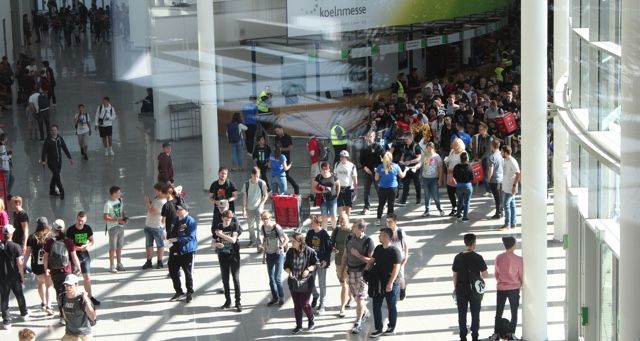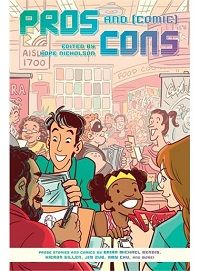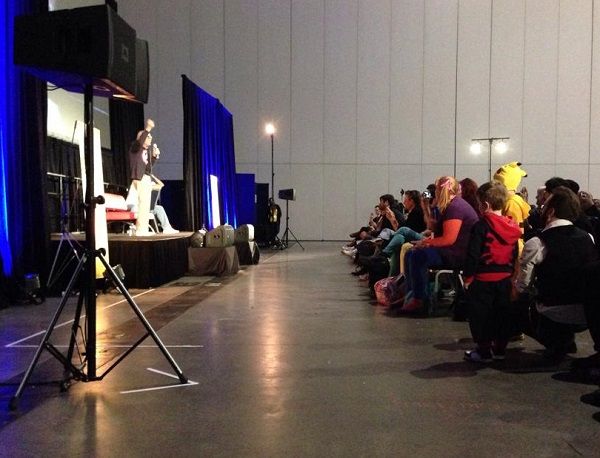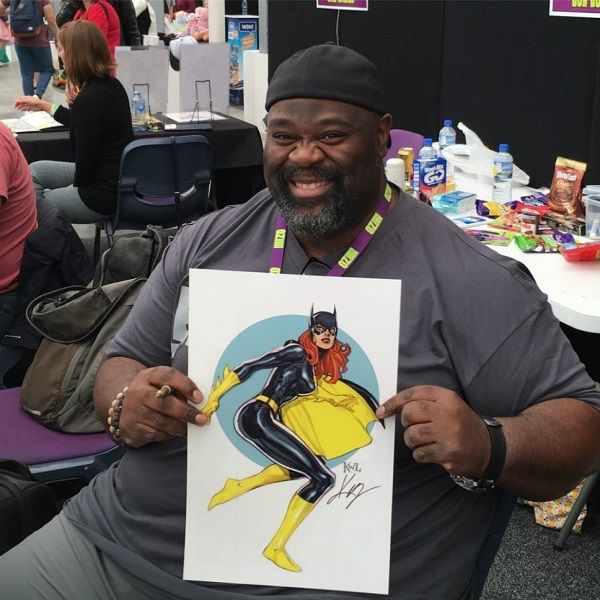
On the Pros and Cons of Comic Cons
There are comic cons taking place every weekend, in various places around the world. Of course, the big names will always hit the mainstream news; July was flooded with Marvel and DC news from San Diego Comic Con (SDCC), while many fans are eagerly awaiting exclusives from New York Comic Con (NYCC) in October. However, smaller conventions also have their charm, showing strong loyalty to their comic book roots. They may not have the big-name drawcards to make lots of money in ticket sales, but your small community convention often showcases fresh new creators alongside the loyal locals.
So what makes the comic con the ultimate geek experience? Is it everything we are lead to believe? And are we still going for the comic books?
You Always Remember Your First
My first comic book convention experience was Supanova Sydney in 2014. We were going for the first time, for me and as a family. The drawcard for us was Stan Lee. Being isolated way down in Australia, it’s rare to score a big name guest like Stan Lee. We were determined not to miss meeting him in person.
Being our first time, we didn’t know what to expect. We had some comics to be signed, a couple of very simple cosplay outfits for the kids, and a backpack carrier for our youngest (she was not yet one year old). And how did it work out?
Well, there were pros and cons.
Did we see Stan Lee? Yes!! We waited four hours in line to meet him, sacrificing any chance of meeting John Barrowman and taking turns in as one parent sat in line while the other chaperoned the kids around the exhibition hall. During Stan’s panel, our two eldest kids were allowed to ask him a question: “Who is your favourite super-hero?” He answered: “Spider-Man, but after that, I can’t choose. I like them all!”
When signing autographs, Stan stayed past closing time to ensure everyone who waited in line was able to meet him. When it was our turn, we suddenly realised we had bought one too many autograph tokens and quickly asked him to sign the cosplay spider I had sewn to the back of our son’s jumper. Stan said it was the best thing he signed all day (and yes, I know he probably said that to everyone). Our kids were happy. We were happy. And we swore not to do the guest signing thing like that ever again UNLESS it was someone SUPER SPECIAL.
Are Comic Cons Still About the Comics?
Since then, we have still sought autographs from some of our favourite creators. Nicola Scott and Tom Taylor are regular favourites at our local comic-cons. Ken Lashley was a surprise treat a few years back. And Queenie Chan is always a pleasure to see!
However, as the popularity of comic cons grows in mainstream media, I have noticed more and more publicity for the TV and movie stars, and less support for the artists and creators. Most of the time, the big-name guests are from comic-related TV/movies, but when I go looking for the fresh talent or the old favourites trying something new, I really have to ‘go looking’.
The first time I met Nicola Scott was Sydney Oz Comic Con 2014. She was tucked away in the Artists’ Alley, hidden from view. While I waited to talk with her about any new books coming out, I watched her interaction with a young man who had brought in a small portfolio of artwork. He was asking what she did to practice her art. Nicola was amazing, in both her patience and her support for him. She took the time to appraise each drawing, adding tips like “Try flexing in the mirror to see how the arm holds in that position” and “Have you tried to stand like that? Was it comfortable? Then don’t do it to your characters.” When the young man left her table, he had purchased some of her concept artwork, leaving with inspiration for both art and kindness. That’s why she remains a favourite of mine today.
The following year, Ken Lashley came over from the United States of America. Unfortunately, he too was hidden away in a crowded corner of Artists’ Alley. At the time, he was feeling a little forlorn as people walked past looking for the merch aisle and missing the artists completely. I was stunned—this was a very talented and popular artist, with a catalogue of work including X-Men and Batgirl! I noticed a packet of Tim Tams (Australian chocolate biscuits) sitting behind him, and I stopped to ask if he knew about Tim Tam slams. We had this great chat about Tim Tams and his artwork and body image. We laughed about the idea of Batgirl/Barbara Gordon doing a Tim Tam slam—I hope one day to buy that art whenever it is done. He thanked me with a signed Batgirl print that hangs on the kids’ bedroom wall, a proud reminder of that day.
There is absolutely nothing wrong with attending comic cons for the merchandise. It’s your fandom, so you can do as you please. But I always feel a little awkward when I hear friends talk about their con experiences and never once visit the Artists’ Alley. When I hear of more positive experiences overseas (particularly in North America), I can’t help but wonder if it’s a cultural thing.
There Is No Standard Convention Culture – Do It Your Way
Earlier this year, some friends travelled from Australia to Seattle to attend Emerald City Comic Con (ECCC). They were lucky enough to meet another friend of mine, fellow Book Rioter S.W. Sondheimer, who was presenting a panel. Of course, this was my opportunity to ask for a comparison between cultures for comic cons.
Yes, mainstream is taking over a lot of comic cons, because that is where the money is. To be completely honest, each convention has its own style and culture to it. Comic cons like ECCC are big events, but are not the same level of fanfare as SDCC and NYCC. They still nurture and value the comic book origins for their conventions. They present fantastic panels on reading and creating and reviewing comic books (like Sondheimer’s panel where they discussed the Bat-wang). For my friends visiting the U.S., the comic-book conventions overseas provide a deeper dive into the world of comic books and not just the sale of them.
Is this the same at SDCC or NYCC? I’m not sure and would love to hear from others. I heard there are more opportunities to be ‘discovered’ in the Artists’ Alley at NYCC and SDCC is still ‘hallowed ground’ for all creators.

And there are stories to find your way back to the soul of a convention. Greg Pak talks of all the reasons he should stop attending, and one story of why he continues: a simple request from a young fan. Marlene Bonnelly shares her experience learning about personal space, while Anthony Oliveira has the best guide for getting the ‘queerest time out of your convention’.
My favourite of all is ‘Step-by-step Guide to Becoming a Geek Journalist’ by Karama Horne. Obvious reasons, obviously—but mostly because she explains exactly how this IS work. She also addresses the lack of diversity amongst geek journalists. I’m white and female. And as much as I work hard to notice the important issues for representation, I am the first admit that I will never be as good as a journalist writing with their #ownvoice.
What to Look For At Your Next Comic Con
Whether you are reporting, reviewing, or revisiting your fandom, comic-book conventions can still be the homage you are looking for. It is in how you approach it:
- Be Prepared: Take along the usual items of necessity—water bottle, food, comfy shoes (even in cosplay), a bag to carry things, hand sanitiser, and a protected sleeve or cardboard tube in case you do purchase that rare autographed commission to be treasured for the rest of your geeky days.
- Venture down the Alley: Go straight to Artists Alley. Even if you are there for the big-name guest, check Artists Alley for their tables and any other creators they support.
- Pay for your loot: Nobody can live off “exposure”. If it’s of value to you, then reciprocate the value to them. Offer to pay for their services. If they are kind enough to offer it as a gift, find some other way to return the generosity—buy their work in the store or promote them on social media or the like.
- Cosplay Your Creation: Never feel you can’t cosplay because your representation wouldn’t be “perfect”. Most creators love to see your cosplay interpretations, revealing how it makes you feel. Sonya Bellantyne nails it when she says, “Maybe, for someone, I’m their Cree Supergirl.” (The Cree are one of the largest groups of First Nations in North America)
- Check out the Panels: Panels are a great place to learn more about the creators and their inspirations. Sometimes, it is simply a great place to hear their stories, including previous experiences at comic book conventions.
- And, of course, Have Fun: This is the place to find your loves and discover new ones. It is supposed to be fun. At any time it stops being fun, step away from the crazy and breathe. If you are unable to step outside to do this, there are plenty of comic book creators who have announced their tables as ‘safe zones’, for anyone who needs to step away from danger from others or the danger within themselves. Gail Simone has volunteered her table at many conventions, usually with an announcement on social media before the event. Stay tuned and stay safe.
For some great tips, check out Kristina’s advice for first-timers here. And for inspiration on how to chat with creators at comic cons, you can’t go wrong with Monica’s experience here. There will always be pros and cons to any comic-book convention. The great ones will be great and the bad ones will be worthy of the memories with learning experience +1. No matter what happens, it will always be your personal experience.



















